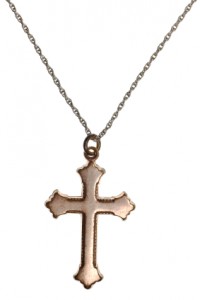LONDON – The Sunday Telegraph has discovered documents that reveal Government ministers will argue that because it is not a “requirement” of the Christian faith, employers can ban the wearing of the cross and fire workers who insist on doing so.
 British government representatives will issue the statement in arguments before the European Court of Human Rights in which two British women will seek to establish their right to display the cross.
British government representatives will issue the statement in arguments before the European Court of Human Rights in which two British women will seek to establish their right to display the cross.
The Government’s position prompted an angry rejoinder from prominent figures including Lord Carey, the former Archbishop of Canterbury. He accused ministers and the courts of “dictating” to Christians and said it was yet another example of Christianity becoming increasingly marginalized in official life.
This decision by the British government to refuse to back the right of Christians to display symbols of their faith at work comes only days after its plans to legalize same-sex marriages were attacked by the leaders of the Roman Catholic Church.
The Strasbourg case hinges on whether human rights laws protect the right to wear a cross or crucifix at work under Article 9 of the European Convention on Human Rights.
It states: “Everyone has the right to freedom of thought, conscience and religion; this right includes freedom to change his religion or belief, and freedom, either alone or in community with others and in public or private, to manifest his religion or belief, in worship, teaching, practice and observance.”
Nadia Eweida and Shirley Chaplin, the Christian women bringing the case, claim they were discriminated against when their employers barred them from wearing the crosses. They are asking the European Court to rule that this violated their human right to manifest their religion.
They say that Christians are given less protection than members of other religions who have been granted special status for garments or symbols such as the Sikh turban or the Muslim hijab. In spite of the fact Sikhs and Muslims are allowed to wear their religious symbols at work, the two women claim they both faced disciplinary action for wearing a cross.
The 61 year-old, from Twickenham, is a Coptic Christian who argued that her employer BA allowed members of other faiths to wear religious garments and symbols. Chaplin, a 56 year old nurse from Exeter, was barred from working on wards by Royal Devon and Exeter NHS Trust after she refused to hide the cross she wore on a necklace chain. As a result she was terminated after 31 years of nursing.
The Government response states: “The Government submit that… the applicants’ wearing of a visible cross or crucifix was not a manifestation of their religion or belief within the meaning of Article 9, and…the restriction on the applicants’ wearing of a visible cross or crucifix was not an ‘interference’ with their rights protected by Article 9.”
The response, prepared by the Foreign Office, adds: “In neither case is there any suggestion that the wearing of a visible cross or crucifix was a generally recognized form of practicing the Christian faith, still less one that is regarded (including by the applicants themselves) as a requirement of the faith.”
The Government intends to oppose cases brought by two other Christians, including a former registrar who objected to conducting civil partnership ceremonies for homosexual couples.
Lillian Ladele, who worked as a registrar for Islington council in north London for 17 years, said she was forced to resign in 2007 after being disciplined, and claimed she had been harassed over her beliefs. Gary McFarlane, a relationship counselor, was terminated by Relate for refusing to give sex therapy to homosexual couples.
The Strasbourg cases brought by Mrs. Chaplin and Mr. McFarlane are supported by the Christian Legal Centre which has instructed Paul Diamond, a leading human rights barrister. Judges in Strasbourg will next decide whether all four cases will progress to full hearings.
Andrea Williams, the director of the Christian Legal Centre, said: “It is extraordinary that a Conservative government should argue that the wearing of a cross is not a generally recognized practice of the Christian faith.
“In recent months the courts have refused to recognize the wearing of a cross, belief in marriage between a man and a woman and Sundays as a day of worship as ‘core’ expressions of the Christian faith. What next? Will our courts overrule the Ten Commandments?”
Liberals in the United States have often alluded to a kinder and more tolerant atmosphere in Great Britain and Europe. Perhaps those of us on this side of the pond would do well to note the type of tolerance being practiced in Europe and set our sights on something else.
 Off The Grid News Better Ideas For Off The Grid Living
Off The Grid News Better Ideas For Off The Grid Living



